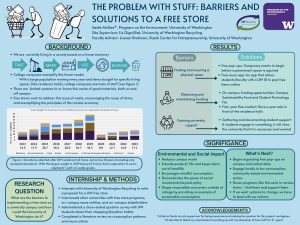The Problem with Stuff: Barriers and Solutions to a Free Store
The current consumption rate is unsustainable. Capitalism convinces the consumer that they need new “stuff”, and raw materials are extracted faster than they can be replenished. College students are a key population in tackling this issue because they are actively entering the consumer market as they enter college. College campuses do not promote sustainable consumption, with frequent housing changes and limited circular economy systems in place. This project promotes sustainable consumption by exploring the potential for a free store. This would be a no-cost reuse facility at the University of Washington that encourages sharing and conscious consumption habits. I examined the feasibility and challenges of implementing a free store through an internship with University of Washington (UW) Recycling, interviews with other university free stores/campus stakeholders, a student survey, and a literature review. My research concluded that the biggest barriers include space constraints, funding, and gaining broad university support. Solutions to these challenges include a temporary pop-up “store,” a campus-wide reuse app, and university-allocated reuse grants. Student support and data tracking will also be critical aspects of the free stores’ long-term success. This project aims to extend the life cycle of goods, fostering a culture and community around reusing using circular economy principles while making sustainable consumption accessible and practical. Free stores promote cultural attitude shifts around “stuff” and help to reframe how university communities acquire and dispose of goods.
